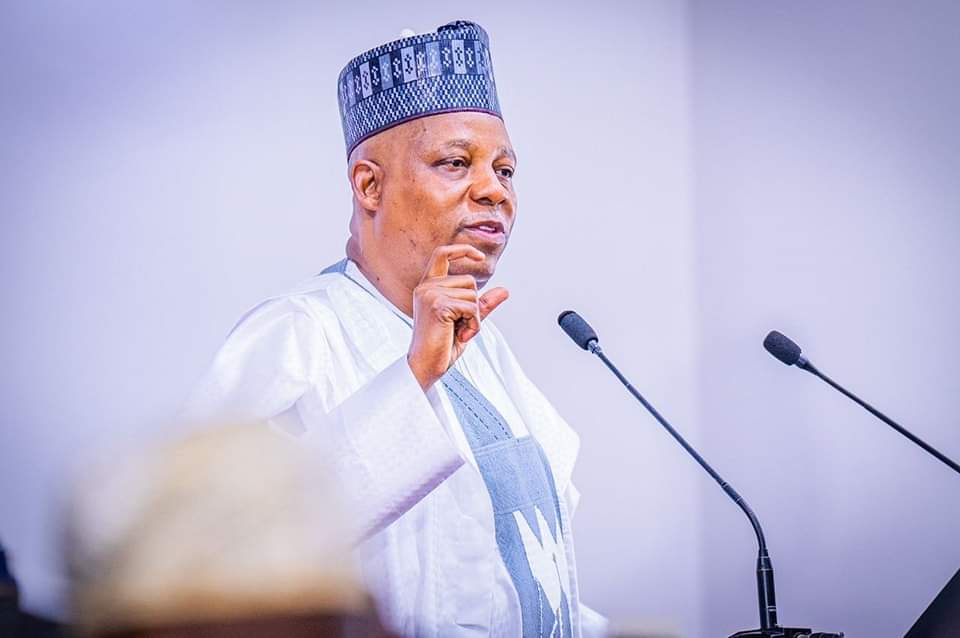Local government areas would now have farm centres across the country. This piece of information was given by the Nigerian Vice President, Kashim Shettima, while canvassing for investors to come to the nation. According to Shettima, the Federal Government is planning to put in place, mechanised farm centres in all the 774 local councils.
The Vice President stated this at the Norman E. Borlaug International Dialogue, Iowa, United States of America, while on a mission to woo investors. The African Development Bank’s World Food Prize-facilitated Norman E. Borlaug International Dialogue, also called the ‘Borlaug Dialogue’, is a gathering of individuals from more than 65 countries fully prepared to address cutting-edge issues related to global food security and nutrition.
He said the programme will help to guarantee food security. “We are helping our farmers increase production and providing essential infrastructure for industries in peri-urban areas to expand their capacity. This is the wisdom for our resolve to establish Mechanisation Service Centres in all our 774 local government areas to facilitate essential primary production services”, he added. Shettima said Nigeria remained the best place to invest, “with about 70 million hectares of underutilised arable land, which is 75 per cent of our total land area”, noting that the country offers a substantial opportunity to both local and foreign investors to boost agricultural productivity.
The Vice President further stated that in order to create profound economic opportunities for investors, the country has enabled interventions such as the “National Agriculture Growth Scheme (NAGS), the Technologies for African Agricultural Transformation (TAAT), the Livestock Productivity and Resilience Support Project (L-PRES), the Green Imperative Project (GIP) and the Special Agro-Industrial Processing Zones (SAPZ) programmes. We are already collaborating with institutions such as the African Development Bank, the World Bank, the International Fund for Agricultural Development (IFAD), the Islamic Development Bank, and the United States Agency for International Development (USAID), to achieve food and nutrition security in Nigeria and beyond.
Shettima, while speaking at this year’s edition with the theme, ‘Harnessing Change’, gave the link between food and national security, adding that the world needs to be alarmed, following instances of the Coronavirus disease (COVID-19) pandemic and ‘geopolitical frictions’. He also noted that “there were substantial opportunities in Nigeria for local and foreign investors to boost agricultural productivity. Our primary objective is to empower our farmers and attract investors. We are increasing primary production to harness the economic potential of agro-processing and industrialisation. This is why, upon assuming office, the President declared a state of emergency in agriculture. We’ve also introduced a range of tax incentives, including tax holidays, deductions for locally-sourced materials, labour incentives, and pioneer status incentives, making it easier to conduct business.
“Notably, we’ve opened the doors to foreign investors, allowing them to have 100% ownership in companies and repatriate their profits and dividends without hindrance. Because we believe that import rules are a significant factor, we’ve established a policy of zero duties on agricultural machinery and imposed restrictions on certain agricultural commodities to stimulate local production. Notably, we’ve opened the doors to foreign investors, allowing them to have 100 percent ownership in companies and repatriate their profits and dividends without hindrance”, he said. On his part, the President, World Food Prize Foundation and former US Ambassador to China, Terry Branstad, had made reference to Shettima as a “rare African statesman whose leadership qualities, loyalty as well as sense of commitment to nationhood and development can best be described as legendary”.
In a similar vein, the Director-General, Nigeria’s Country Department, African Development Bank (AfDB), Lamin Barrow, has said that the bank’s portfolio investments in Nigeria are one of the largest among the regional member countries with a total commitment value of US$4.4 billion. Barrow stated this at this year’s Country Portfolio Performance Review Workshop in the Federal Capital Territory, Abuja. This performance, however, is a reduction from the US$5 billion worth of portfolio in 63 operations recorded in 2022. Barrow, while reiterating the bank’s commitment to promote investments in the country, said 48 separate funding was evenly distributed between public and private sector operations in the country. He said that currently, the bank’s portfolio in Nigeria is one of the largest among the regional member countries with a total commitment value of US$4.4 billion.
The Director-General acknowledged its portfolio performance metrics, noting that a collective effort from the Federal Ministry of Finance, the executing agencies, and the bank had helped to reduce start-up and implementation delays. “These improvements were a result of collective efforts from the Federal Ministry of Finance, the executing agencies, and the bank, to reduce start-up and implementation delays. Indeed, the time taken to meet loan effectiveness and first disbursement conditions tend to be excessive. This progress notwithstanding, we are yet to be where we should be. The bank’s corporate target for flagged operations is 20%. With diligent monitoring of the procurement plans implementation processes, we can achieve 100 % compliance”, he disclosed.
Meanwhile, the Odio Investment Cooperative and Credit Society Limited has revealed plans to begin training for farmers and small-scale business owners on how to export their produce, adding that the farmers would be exposed to how to access credit facilities to boost their businesses, and that the training will be taking place in all the 774 local government areas of the country under the ‘Light Up Nigeria Project’. The Chairman of Odio Investment Cooperative and Credit Society Limited, Prince Amezhinm Atuma, stated this at the official launching of the project in Degema, headquarters of Degema Local Government Area of Rivers State. Atuma further said that the project, which is in collaboration with some banks and government agencies, is to ensure that rural dwellers have access to financial institutions as well as electricity to grow their businesses.



